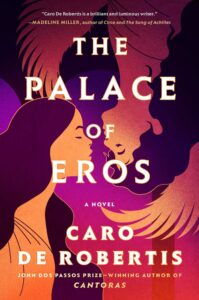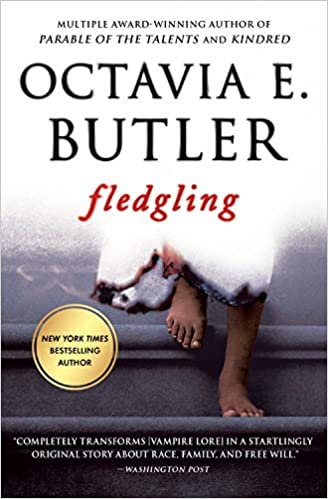Buy this from Bookshop.org to support local bookstores and the Lesbrary!
It’s no secret that Anne Carson has inspired many a sapphic love affair with ancient Greek myths, or that stories like Malinda Lo’s Ash, Sarah Diemer’s The Dark Wife, and a vast world of AU fanfiction showed that the threads from which most modern myths are spun could also be woven in ways that mirrored the desires in sapphics’ hearts.
So I am delighted to review Caro de Robertis’s The Palace of Eros. A retelling of a classic Greek myth, this decidedly mature version of Eros and Psyche’s story is so beautiful in its refusal to be reductive, and so human in the ways de Robertis lets their characters be selfish, arrogant, misguided, desirous, demanding, and just messy, messy sapphics that are still capable of tender love and care. There is hurt, there is pain, but there are also two lovers coming together time and time again to work through their difficulties.
You know the bare bones of the narrative. Aphrodite, goddess of love, beauty and fertility, gets peeved when people dare to compare Psyche’s mortal’s beauty to her own immortal one. So she sends Eros to force Psyche to fall in love with a monster of a man…only for Eros to end up falling for her and whisking her away to an enchanted palace. Like most Greek mythology that was translated into the English imagination by a bunch of misogynistic male aristocrats whose wealth and education came at the expense of an empire of exploitation (so, most Greek mythology), this story is ripe for the personal projection of all sorts of sexist nonsense. But in de Robertis’ capable hands, those bare bones are reincarnated into something much more caring and empathetic: a beautiful parable about the crushing weight and isolation that can come from hiding the truth of yourself, as well as the double-edged fragility of rooting your sense of self and power in physical attractiveness.
It is also a defiant, joyous, sensual ode to queer desire and passion. Living up to the title, the novel explores various aspects of the erotic throughout the POV heroines’ journey to self-actualization. I’m very pleased to say that calling this prose more wonderfully mythical than many a translation would likely make Joseph Campbell roll in his grave. So I shall. While it starts off a little choppy and takes a chapter or two to find its flow, it then becomes a nuanced take on the importance of art in developing one’s sense of expression and liberation—about the ways mistakes in safe environment leads to innovation and a better understanding of yourself and the world around you.
This isn’t some two-bit story about a femme being whisked away by a (relatively more) masc partner and then having all her problems resolved (and her character flattened) by a shower of money and/or magical prowess. This is a novel that captures how finally practicing a pottery technique to perfection can lead to the same rush of climactic satisfaction as being with an especially attentive lover. Time, focus, and care tis needed for both.
Finally, historical-esque fiction that doesn’t feel the need to fade-to-black on me! It’s not a bodice ripper, not by a long shot, but nor is de Robertis shy about showing their characters’ more carnal needs. The prose doesn’t linger too long on anatomical terms or mechanistic descriptions about what is going where exactly, instead choosing to ratchet up the sensuality through metaphor and sensory imagery that give readers strong visuals while leaving enough room for personal imaginations to get some say in the final vision.
Did I mention the absolutely poetic ways this book describes intimacy?! It’s enough to make a sapphic swoon.
But all the heartwarming lushness that blooms in isolation cannot remain forever insulated. As Psyche grows more comfortable in herself as a sensual and sensory being, her imagination expands. And as Eros grows more comfortable with the idea of being loved for all the parts once deemed monstrous, the two’s growing sense of possibility starts to chafe at the restrictions imposed by others’ petty insecurities—which themselves betray deeper anxieties about the status quo. With their families’ desire to defend the status quo they’ve sacrificed their dreams to creating violent storm clouds on the horizon, Eros and Psyche must reckon with who they want to be and become in order to keep their blossoming love alive.
In that way, it is also a timely book, and one I will recommend when people ask for something romantic, sensual, and ultimately hopeful about the way queer desire—both for others and for our truest selves— can be a catalyst for change.
Who Will Enjoy This?
- Readers who enjoy the gentle pacing and focus on creative work in cozy fantasy but also works that grapple with the power dynamics of literary and historical conventions.
- Readers with a deep nostalgia for femslash Greek Mythology AU fanfiction (there was some gold in those hills).
- Readers looking for prose that fully evokes all the sensorial dimensions of the word “lush”.




